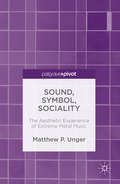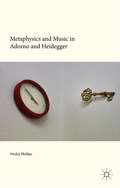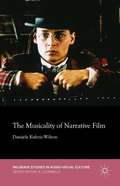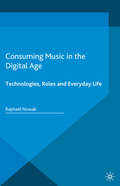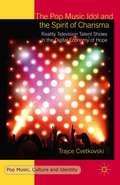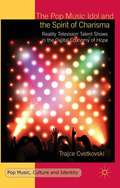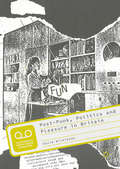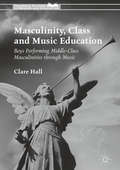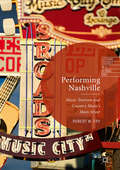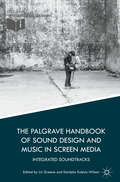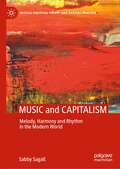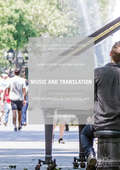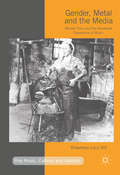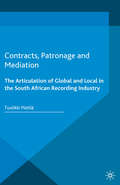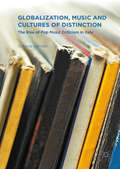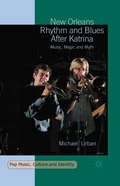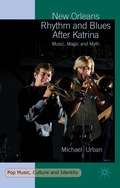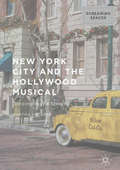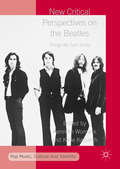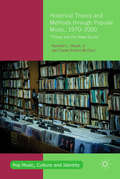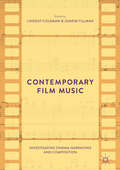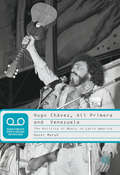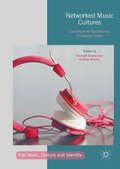- Table View
- List View
Sound, Symbol, Sociality
by Matthew P. UngerBased on ethnographic research within the extreme metal community, Unger offers a thought-provoking look at how symbols of authenticity and defilement fashion social experience in surprising ways. Exploring the many themes and ciphers that comprise this musical community, this book interprets aesthetic resonances as a way to understand contemporary identity, politics, and social relations. In the end, this book develops a unique argument: the internal composition of the community's music and sound moulds symbols that shape, reflect, and constrain social patterns of identity, difference, and transgression. This book contributes to the sociology of sound and music, the study of religion in popular culture, and the role of aesthetics in everyday life. It will be of interest to upper level students, post-graduate students and scholars of religion, popular culture, and philosophy.
Metaphysics and Music in Adorno and Heidegger
by Wesley PhillipsMetaphysics and Music in Adorno and Heidegger seeks to show how two notoriously opposed German philosophers share a rethinking of the contemporary possibility of metaphysics via notions of music and waiting. Interweaving discourses of philosophy, critical theory, cultural studies and aesthetics, the book puts forward the idea of an expression of waiting in vain as constituting an alternative comportment of promise, in a situation where the promise of metaphysics is questionable. These findings are connected to the broader, historical materialist promise of social change. Throughout the book, the Italian composer Luigi Nono is taken to exemplify the temporal and spatial character of this expression. Metaphysics and Music in Adorno and Heidegger includes new interpretations of both Adorno and Heidegger, and will be of interest to students and scholars of both critical aesthetics and radical thought.
The Musicality of Narrative Film
by Danijela Kulezic-WilsonFilm is often compared to music, explained by the use of musical terms and even conceived and structured using music as a model. The Musicality of Narrative Film is the first book to offer an in-depth examination of the film/music analogy through comparative analysis of both arts' common denominators: time, rhythm and movement. Drawing on a number of examples from contemporary art-house and mainstream cinema, Kulezic-Wilson argues that film's musical potential can be realized through various cinematic devices, with or without music. The book's final section contains detailed case studies of Darren Aronofsky's p, Jim Jarmusch's Dead Man and Joe Wright's Anna Karenina, which demonstrate how various factors contribute to achieving the effect of musicality in a large-scale form and how contrasting approaches to film time, rhythm and movement can create very different examples of film musicality.
Consuming Music in the Digital Age: Technologies, Roles and Everyday Life (Pop Music, Culture and Identity)
by Raphaël NowakThis book addresses the issue of music consumption in the digital era of technologies. It explores how individuals use music in the context of their everyday lives and how, in return, music acquires certain roles within everyday contexts and more broadly in their life narratives.
The Pop Music Idol and the Spirit of Charisma: Reality Television Talent Shows in the Digital Economy of Hope (Pop Music, Culture and Identity)
by T. CvetkovskiThis book makes a case for the synergetic union between reality TV and the music industry. It delves into technological change in popular music, and the role of music reality TV and social media in the pop production process. It challenges the current scholarship which does not adequately distinguish the economic significance of these developments.
The Pop Music Idol and the Spirit of Charisma: Reality Television Talent Shows in the Digital Economy of Hope (Pop Music, Culture and Identity)
by Trajce CvetkovskiThis book makes a case for the synergetic union between reality TV and the music industry. It delves into technological change in popular music, and the role of music reality TV and social media in the pop production process. It challenges the current scholarship which does not adequately distinguish the economic significance of these developments.
Post-Punk, Politics and Pleasure in Britain
by David WilkinsonAs the Sex Pistols were breaking up, Britain was entering a new era. Punk's filth and fury had burned brightly and briefly; soon a new underground offered a more sustained and constructive challenge. As future-focused, independently released singles appeared in the wake of the Sex Pistols, there were high hopes in magazines like NME and the DIY fanzine media spawned by punk. Post-Punk, Politics and Pleasure in Britain explores how post-punk's politics developed into the 1980s. Illustrating that the movement's monochrome gloom was illuminated by residual flickers of countercultural utopianism, it situates post-punk in the ideological crossfire of a key political struggle of the era: a battle over pleasure and freedom between emerging Thatcherism and libertarian, feminist and countercultural movements dating back to the post-war New Left. Case studies on bands including Gang of Four, The Fall and the Slits and labels like Rough Trade move sensitively between close reading, historical context and analysis of who made post-punk and how it was produced and mediated. The book examines, too, how the struggles of post-punk resonate down to the present.
Masculinity, Class and Music Education: Boys Performing Middle-Class Masculinities through Music (Palgrave Studies in Gender and Education)
by Clare HallThis book offers a provocative sociological examination of masculinity, class and music education within the context of a unique and fascinating culture: the classical musical world of choirboys. The myriad cultural meanings embodied in the ‘boy voice’ are unravelled through compelling musical narratives of young choirboys, their mothers, and their teachers. The book investigates how boys negotiate dominant gender-class discourses and the various pedagogies involved in producing middle-class masculinities during primary school and early years contexts. Drawing on the theoretical resources of Bourdieu to develop the concept of ‘musical habitus’, the continued symbolic distinction of the choirboy is analysed in order to better understand how culture is simultaneously reproduced and evolving through music. This interdisciplinary work at the juncture of pedagogy and culture will appeal to social science researchers, educators and arts practitioners interested in the sociocultural dynamics of music.
Performing Nashville
by Robert W. FryThis book explores the formation and continuance of Nashville, Tennessee as a music place, the importance of the fans (tourists) in creating Nashville's multifaceted musical identity, and the music and city's influence on the formation and performance of the individual and collective identities of the country-music fan. More importantly, the author discusses the larger issue of country music as a signifier of tradition suggesting that for many visitors, the music serves as a soundtrack, while Nashville serves as a performative space that permits the creation, performance, and remembrance of not only the country-music tradition, but also various individual and collective traditions and an idealized American identity. Through the theatrics of tourism, Nashville and its connection to country music are performed daily, reinforced through the sound and landscape of country music. Performing Nashville will be of interest to students and scholars across a range of disciplines, including tourism studies, leisure studies, ethnomusicology, sociology, folklore and anthropology.
The Palgrave Handbook of Sound Design and Music in Screen Media
by Liz Greene Danijela Kulezic-WilsonThis book bridges the existing gap between film sound and film music studies by bringing together scholars from both disciplines who challenge the constraints of their subject areas by thinking about integrated approaches to the soundtrack. As the boundaries between scoring and sound design in contemporary cinema have become increasingly blurred, both film music and film sound studies have responded by expanding their range of topics and the scope of their analysis beyond those traditionally addressed. The running theme of the book is the disintegration of boundaries, which permeates discussions about industry, labour, technology, aesthetics and audiovisual spectatorship. The collaborative nature of screen media is addressed not only in scholarly chapters but also through interviews with key practitioners that include sound recordists, sound designers, composers, orchestrators and music supervisors who honed their skills on films, TV programmes, video games, commercials and music videos.
MUSIC and CAPITALISM: Melody, Harmony and Rhythm in the Modern World (Critical Political Theory and Radical Practice)
by Sabby SagallThis book argues that the need for music, and the ability to produce and enjoy it, is an essential element in human nature. Every society in history has produced some characteristic style of music. Music, like the other arts, tells us truths about the world through its impact on our emotional life. There is a structural correspondence between society and music. The emergence of 'modern art music' and its stylistic changes since the rise of capitalist social relations reflect the development of capitalist society since the decline of European feudalism. The leading composers of the different eras expressed in music the aspirations of the dominant or aspiring social classes. Changes in musical style not only reflect but in turn help to shape changes in society. This book analyses the stylistic changes in music from the emergence of ‘tonality’ in the late seventeenth century until the Second World War.
Music and Translation: New Mediations in the Digital Age (Palgrave Studies in Translating and Interpreting)
by Lucile DesblacheThis book explores how transformations and translations shape musical meanings, developments and the perception of music across cultures. Starting with the concept of music as multimodal text, the author understands translation as the process of transferring a text from one language – verbal or not – into another, interlingually, intralingually or intersemiotically, as well as the products that are derived from this process. She situates music and translation within their contemporary global context, examining the tensions between local and global, cosmopolitan and national, and universal and specific settings, to arrive at a celebration of the translational power of music and an in-depth study of how musical texts are translated. This book will be of interest to translation studies scholars who want to broaden their horizons, as well as to musicians and music scholars seeking to understand how cultural exchange and dissemination can be driven by translation.
Gender, Metal and the Media: Women Fans and the Gendered Experience of Music (Pop Music, Culture and Identity)
by Rosemary Lucy HillThis book is a timely examination of the tension between being a rock music fan and being a woman. From the media representation of women rock fans as groupies to the widely held belief that hard rock and metal is masculine music, being a music fan is an experience shaped by gender. <P><P>Through a lively discussion of the idealised imaginary community created in the media and interviews with women fans in the UK, Rosemary Lucy Hill grapples with the controversial topics of groupies, sexism and male dominance in metal. She challenges the claim that the genre is inherently masculine, arguing that musical pleasure is much more sophisticated than simplistic enjoyments of aggression, violence and virtuosity. <P>Listening to women’s experiences, she maintains, enables new thinking about hard rock and metal music, and about what it is like to be a women fan in a sexist environment.
Gender, Metal and the Media: Women Fans and the Gendered Experience of Music (Pop Music, Culture and Identity)
by Rosemary Lucy HillThis book is a timely examination of the tension between being a rock music fan and being a woman. From the media representation of women rock fans as groupies to the widely held belief that hard rock and metal is masculine music, being a music fan is an experience shaped by gender. Through a lively discussion of the idealised imaginary community created in the media and interviews with women fans in the UK, Rosemary Lucy Hill grapples with the controversial topics of groupies, sexism and male dominance in metal. She challenges the claim that the genre is inherently masculine, arguing that musical pleasure is much more sophisticated than simplistic enjoyments of aggression, violence and virtuosity. Listening to women’s experiences, she maintains, enables new thinking about hard rock and metal music, and about what it is like to be a women fan in a sexist environment.
Contracts, Patronage and Mediation: The Articulation of Global and Local in the South African Recording Industry (Pop Music, Culture and Identity)
by Tuulikki PietiläThis book studies the long-term developments in the South African recording industry and adds to the existing literature an understanding of the prevalence of informal negotiations over rights, rewards and power in the recording industry. It argues that patronage features often infiltrate the contractual relationships in the industry.
Globalization, Music and Cultures of Distinction
by Simone VarrialeThis book is the first comprehensiveaccount of how Anglo-American popular music transformed Italian cultural life. Drawing on neglected archival materials, the author explores the rise of newmusical tastes and social divisions in late twentieth century Italy. The book reconstructs the emergence of popmusic magazines in Italy and offers the first in-depth investigation of therole of critics in global music cultures. It explores how class, gender, raceand geographical location shaped the production and consumption of music magazines,as well as critics' struggle over notions of expertise, cultural value andcosmopolitanism. Globalization, Music and Cultures ofDistinction provides an innovative framework for studying how globalization transforms cultural institutions andaesthetic hierarchies, thus breaking new ground for sociological and historicalresearch. It will be essential reading for scholars and students interested incultural sociology, popular music, globalization, media and cultural studies,social theory and contemporary Italy.
New Orleans Rhythm and Blues After Katrina: Music, Magic and Myth (Pop Music, Culture and Identity)
by Michael UrbanMusic, magic and myth are elements essential to the identities of New Orleans musicians. The city's singular contributions to popular music around the world have been unrivaled; performing this music authentically requires collective improvisation, taking performers on sonorous sojourns in unanticipated, 'magical' moments; and membership in the city's musical community entails participation in the myth of New Orleans, breathing new life into its storied traditions. On the basis of 56 open-ended interviews with those in the city's musical community, Michael Urban discovers that, indeed, community is what it is all about. In their own words, informants explain that commercial concerns are eclipsed by the pleasure of playing in 'one big band' that disassembles daily into smaller performing units whose rosters are fluid, such that, over time, 'everybody plays with everybody'. Although Hurricane Katrina nearly terminated the city, New Orleans and its music—in no small part due to the sacrifices and labors of its musicians—have come back even stronger. Dancing to their own drum, New Orleanians again prove themselves to be admirably out of step with the rest of America.
New Orleans Rhythm and Blues After Katrina: Music, Magic and Myth (Pop Music, Culture and Identity)
by Michael UrbanMusic, magic and myth are elements essential to the identities of New Orleans musicians. The city's singular contributions to popular music around the world have been unrivaled; performing this music authentically requires collective improvisation, taking performers on sonorous sojourns in unanticipated, 'magical' moments; and membership in the city's musical community entails participation in the myth of New Orleans, breathing new life into its storied traditions. On the basis of 56 open-ended interviews with those in the city's musical community, Michael Urban discovers that, indeed, community is what it is all about. In their own words, informants explain that commercial concerns are eclipsed by the pleasure of playing in 'one big band' that disassembles daily into smaller performing units whose rosters are fluid, such that, over time, 'everybody plays with everybody'. Although Hurricane Katrina nearly terminated the city, New Orleans and its music—in no small part due to the sacrifices and labors of its musicians—have come back even stronger. Dancing to their own drum, New Orleanians again prove themselves to be admirably out of step with the rest of America.
New York City and the Hollywood Musical
by Martha ShearerIn examining the relationship between the spectacular, iconic and vibrant New York of the musical and the off-screen history and geography of the real city--this book explores how the city shaped the genre and equally how the genre shaped representations of the city. Shearer argues that while the musical was for many years a prime vehicle for the idealization of urban density, the transformation New York underwent after World War II constituted a major challenge to its representation. Including analysis of 42nd Street, Swing Time, Cover Girl, On the Town, The Band Wagon, Guys and Dolls, West Side Story and many other classic and little-known musicals--this book is an innovative study of the relationship between cinema and urban space.
New Critical Perspectives on the Beatles
by Kenneth Womack Katie KapurchThe Beatles are probably the most photographed band in history and are the subject of numerous biographical studies, but a surprising dearth of academic scholarship addresses the Fab Four. New Critical Perspectives on the Beatles offers a collection of original, previously unpublished essays that explore 'new' aspects of the Beatles. The interdisciplinary collection situates the band in its historical moment of the 1960s, but argues for artistic innovation and cultural ingenuity that account for the Beatles' lasting popularity today. Along with theoretical approaches that bridge the study of music with perspectives from non-music disciplines, the texts under investigation make this collection 'new' in terms of Beatles' scholarship. Contributors frequently address under-examined Beatles texts or present critical perspectives on familiar works to produce new insight about the Beatles and their multi-generational audiences.
Historical Theory and Methods through Popular Music, 1970–2000
by Jr. Kenneth L. Shonk Daniel Robert McclureThis book examines the post-1960s era of popular music in the Anglo-Black Atlantic through the prism of historical theory and methods. By using a series of case studies, this book mobilizes historical theory and methods to underline different expressions of alternative music functioning within a mainstream musical industry. Each chapter highlights a particular theory or method while simultaneously weaving it through a genre of music expressing a notion of alternativity--an explicit positioning of one's expression outside and counter to the mainstream. Historical Theory and Methods through Popular Music seeks to fill a gap in current scholarship by offering a collection written specifically for the pedagogical and theoretical needs of those interested in the topic.
Contemporary Film Music: Investigating Cinema Narratives and Composition
by Lindsay Coleman Joakim TillmanThe purpose of this book, through its very creation, is to strengthen the dialogue between practitioner and theorist. To that end, a film academic, a composer, and a composer/musicologist have collaborated as editors on this book, which is in turn comprised of interviews with composers alongside complementary chapters that focus on a particular feature of the composer's approach or style, written by a musicologist or film academic who specializes in that particular element of the composer's output. In the interview portions of this book, eight major film composers discuss their work from the early 1980s to the present day. The focus is on the practical considerations of film composition, the relationship each composer has with the moving image, technical considerations, personal motivations in composing, the relationships composers have with their directors, and their own creative processes. Contemporary Film Music also explores the contemporary influence of electronic music, issues surrounding the mixing of soundtracks, music theory, and the evolution of composers' musical voices.
Hugo Chávez, Alí Primera and Venezuela
by Hazel MarshUnlike much of the literature on Venezuela in the Ch#65533;vez period, this book shifts focus away from 'top down' perspectives to examine how Venezuelan folksinger Al#65533; Primera (1942-1985) became intertwined with Venezuelan politics, both during his lifetime and posthumously. Al#65533;'s 'Necessary Songs' offered cultural resources that enabled Ch#65533;vez to connect with pre-existing patterns of grassroots activism in ways that resonated deeply with the poor and marginalised masses. Official support for Al#65533;'s legacy led the songs to be used in new ways in the Ch#65533;vez period, as Venezuelans actively engaged with them to redefine themselves in relation to the state and to reach new understandings of their place within a changed society. This book is essential reading not only for those interested in popular music and politics, but for all those seeking to better understand how Ch#65533;vez was able to successfully identify himself so profoundly with the Venezuelan masses, and they with him.
Networked Music Cultures
by Raphaël Nowak Andrew WhelanThis collection presents a range of essays on contemporary music distribution and consumption patterns and practices. The contributors to the collection use a variety of theoretical and methodological approaches, discussing the consequences and effects of the digital distribution of music as it is manifested in specific cultural contexts. The widespread circulation of music in digital form has far-reaching consequences: not least for how we understand the practices of sourcing and consuming music, the political economy of the music industries, and the relationships between format and aesthetics. Through close empirical engagement with a variety of contexts and analytical frames, the contributors to this collection demonstrate that the changes associated with networked music are always situationally specific, sometimes contentious, and often unexpected in their implications. With chapters covering topics such as the business models of streaming audio, policy and professional discourses around the changing digital music market, the creative affordances of format and circulation, and local practices of accessing and engaging with music in a range of distinct cultural contexts, the book presents an overview of the themes, topics and approaches found in current social and cultural research on the relations between music and digital technology.
Popular Music in Eastern Europe
by Ewa MazierskaThis book explores popular music in Eastern Europe during the period of state socialism, in countries such as Poland, Hungary, Yugoslavia, Romania, Czechoslovakia, the GDR, Estonia and Albania. It discusses the policy concerning music, the greatest Eastern European stars, such as Karel Gott, Czesław Niemen and Omega, as well as DJs and the music press. By conducting original research, including interviews and examining archival material, the authors take issue with certain assumptions prevailing in the existing studies on popular music in Eastern Europe, namely that it was largely based on imitation of western music and that this music had a distinctly anti-communist flavour. Instead, they argue that self-colonisation was accompanied with creating an original idiom, and that the state not only fought the artists, but also supported them. The collection also draws attention to the foreign successes of Eastern European stars, both within the socialist bloc and outside of it. v>
